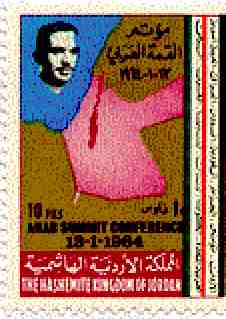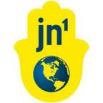 In the most extensive remarks to date on his proposed Middle East agreement, U.S. President Bill Clinton made a plea Sunday for peace, telling U.S. Jewish leaders their land also is the Palestinians' homeland and "there is no choice but for you to divide this land into two states for two people." —— Speech to the Israel Policy Forum, Jan 7, 2001
In the most extensive remarks to date on his proposed Middle East agreement, U.S. President Bill Clinton made a plea Sunday for peace, telling U.S. Jewish leaders their land also is the Palestinians' homeland and "there is no choice but for you to divide this land into two states for two people." —— Speech to the Israel Policy Forum, Jan 7, 2001
Yet Jordan is also Palestine. Here are two Jordanian State Stamps one from 1964, bearing the likeness of King Hussein and pictures Mandated Palestine as an undivided territory [All of Israel of today plus Jordan of today]..., the other a 1949 stamp pictures King Abdullah of the kingdom of Jordan and bears the label of Palestine in English and Arabic.
The land on which Israel was located contained only a fraction of the Palestine Mandate originally dedicated to the Jews as their homeland, incorporating the Balfour Declaration. The League of Nations and the British had designated the land called "Palestine" for the "Jewish National Home" —— east and west of the Jordan River from the Mediterranean to Arabia and Iraq, and north and south from Egypt to Lebanon and Syria. Historian Arnold Toynbee observed in 1918 that the "desolate" land "which lies east of the Jordan stream," was
capable of supporting a large population if irrigated and cultivated scientifically. ... The Zionists have as much right to this no-man's land as the Arabs, or more.
Thus, the territory known variously as "Palestine," as "South Syria," as "Eastern and Western Palestine," or as part of "Turkey" had been designated by international mandate as a "Jewish National Home," concerning which the United States declared,
That there be established a separate state of Palestine.... placed under Great Britain as a mandatory of the League of Nations ... that the Jews be invited to return to Palestine and settle there.... and being further assured that it will be the policy of the League of Nations to recognize Palestine as a Jewish state as soon as it is a Jewish state in fact. . . . England, as mandatory, can be relied on to give the Jews the privileged position they should have without sacrificing the [religious and property] rights of non-Jews.
The Arabs of that day achieved independent Arab statehood in various lands around Palestine but not within Palestine itself Sovereignty was granted after World War I to the Arabs in Syria and Iraq; in addition, Saudi Arabia consisted of approximately 865,000 square miles of territory that was designated as "purely Arab"
Considering all the "territories" that had been given to the Arabs, Lord Balfour "hoped" that the "small notch" of Palestine east and west of the Jordan River, which was "being given" to the Jewish people, would not be "grudged" to them by Arab leaders .
But, in a strategic move, the British Government apparently felt "the need to assuage the Emir's [Abdullah's] feelings."7 As one of the royal sons of the Hejaz (Saudi Arabia), Abdullah was a recipient of British gratitude; the Arabians of the Hejaz had been, among all the Arab world, of singular assistance to England against the Turks8
The insertion of Abdullah and his emirate into mandated Palestine, in the area east of the Jordan River that was part of the land allocated to the "Jewish National Home," might be partially traced to a suggestion received by Colonial Secretary Winston Churchill from T. E. Lawrence. In a letter of January 1921, Lawrence informed Churchill that Emir Feisal (Abdullah's brother, and Lawrence "of Arabia's" choice to lead the Arab revolt)9 had "agreed to abandon all claim of his father to [Western] Palestine," if Feisal got in return Iraq and Eastern Palestine as Arab territories. [See Feisal-Weizmann agreement]
Further explanation was found in a "secret dispatch from Chief British Representative at Amman" later in 1921. He cautioned that the local "Transjordanian Cabinet" had been replaced by a "Board of Secretaries,"
responsible for all internal affairs, referring to his highness Abdullah for a decision in the event of any disagreement....
All the "Board" members, according to the Eastern Palestine envoy, were
Syrian exiles, who with perhaps one exception, are more interested in designs on the French in Syria than in developing Trans-Jordania.... In his Highness' opinion, the allies had not dealt fairly with the Arab nation and Great Britain had not treated him as he deserved. He was one of the most chiefly instrumental in bringing about the Arab revolution and when Feisal, during the war, was inclined to accept the overtures of the Turks he had opposed that policy.... When he came to Trans-Jordania "with the consent of the British", he had agreed to act in accordance with Mr. Churchill's wishes and with British policy, as he did not wish to be the cause of any friction between the British and their allies, the French.
... The allies had not dealt fairly with the Arabs because, whereas they had agreed to form one Arab nation, forming different Arab states, and even in Syria, as small as it is, they had divided that country into six or seven states. He had come to Trans-Jordania hoping for great things and now he realized that he had no hope either north or east. If he went back from here to the Hejaz, he would look ridiculous.
Winston Churchill proposed his plan for Transjordan to Prime Minister Lloyd George in March 1921:
We do not expect or particularly desire, indeed, Abdullah himself to undertake the Governorship. He will, as the Cabinet rightly apprehend, almost certainly think it too small.... The actual solution which we have always had in mind and for which I shall work is that which you described as follows: while preserving Arab character of area and administration to treat it as an Arab province or adjunct of Palestine.
It was a British Jew, Palestine High Commissioner Sir Herbert Samuel, who supported and even extended Winston Churchill's formulations. Samuel sent a telegram to Churchill in July 1921; while discouraging Churchill from submitting to Abdullah's predicted eventual "demand" for "attachment of Trans-Jordania to, the Hejaz," as being "contrary to Article V of the Mandate and open to much objection in relation to future development," High Commissioner Samuel suggested the following:
I concur in proposal that Abdullah should visit London and had writtcn to you suggesting it.... At the end of six months, the following settlement might be arranged:
(1) the Arab governor mutually agreed upon by his majesty's government and Abdullah or King Hussein.
(2) British officer(s) to have real control.
(3) Reserve force commanded by British officer(s), Air Force and armored cars as at present.
(4) A small British garrison to be stationed in District temporarily.
(5) A declaration in accordance with new article to be inserted in mandate that Jewish National Home provisions do not apply east of Jordan. This would not prevent such Jewish immigration as political and economic conditions allowed but without special encouragement by Government.
Feisal got his wishes and became King of Iraq; his brother Abdullah was installed in the British mandatory area as ruler of the "temporary" emirate on the land of eastern Palestine, which became known as the "Kingdom of Transjordan."
Palestine High Commissioner Harold MacMichael later offered some evidence —— of the original "temporary" nature of British intentions in a "private, personal and most secret" cipher; MacMichael reported in 1941 that Abdullah now harbored greater ambitions, because of
the part he [Abdullah] played in the last war, his position in the Arab world as a senior member of a royal house, [and] the purely temporary arrangements whereby in 1921 having narrowly missed being made King (a) of Iraq and (b) of Syria in turn, he was left to look after Trans-Jordan ....
Britain nevertheless quietly gouged out roughly three-fourths of the Palestine territory mandated for the Jewish homeland15 into an Arab emirate, Transjordan,16 while the Mandate ostensibly remained in force but in violation of its terms.17 Historians and official government documents concerned with the area continued to call it "Eastern Palestine," despite the new appellation. That seventy-five percent of the Palestine mandate was described by England's envoy to Eastern Palestine:18 "a reserve of land for use in the resettlement of Arabs [from Western Palestine], once the National Home for the Jews in Palestine"* resulted in the "Jewish independent state."
The League of Nations Mandate for Palestine remained unchanged even though Britain had unilaterally altered its map and its purpose. The Mandate included Transjordan until 1946, when that land was declared an independent state. Transjordan had finally become the de jure Arab state in Palestine just two years before Israel gained its Jewish statehood in the remaining one-quarter of Palestine; Transjordan comprised nearly 38,000 square miles; Israel, less than 8,000 square miles.
[* As the next chapters will illustrate, instead, Arabs poured from Eastern Palestine as well as from Arab areas within Western Palestine —— into the Jewish —— settled areas in Western Palestine. The course of action which followed from that unrecognized population movement brought ramifications which are as critical to the question of political "justice" as they are unknown or disregarded today.]
Thus, about seventy-five percent of Palestine's "native soil," east of the Jordan River, called Jordan, is literally an independent Palestinian-Arab state located on the majority of the land of Palestine; it contains a majority of Palestinian Arabs in its army as well as its population. In April 1948, just before the formal hostilities were launched against Israel's statehood, Abdullah of Transjordan declared: "Palestine and Transjordan are one, for Palestine is the coastline and Transjordan the hinterland of the same country." Abdullah's policy was defended against "Arab challengers" by Prime Minister Hazza al-Majali:
We are the army of Palestine.... the overwhelming majority of the Palestine Arabs ... are living in Jordan.
Although Abdullah's acknowledgment of Palestinian identity was not in keeping with the policy of his grandson, the present King Hussein, Jordan is nonetheless undeniably Palestine, protecting a predominantly Arab Palestinian population with an army containing a majority of Arab Palestinians, and often governed by them as well. Jordan remains an independent Arab Palestinian state where a Palestinian Arab "law of return" applies: its nationality code states categorically that all Palestinians are entitled to citizenship by right unless they are Jews. In most demographic studies, and wherever peoples are designated, including contemporary Arab studies, the term applied to citizens of Jordan is "Palestinian/Jordanian." In 1966 PLO spokesman Ahmed Shukeiry declared that
The Kingdom of Palestine must become the Palestinian Republic....
Yasser Arafat has stated that Jordan is Palestine. Other Arab leaders, even King Hussein and Prince Hassan of Jordan, from time to time have affirmed that "Palestine is Jordan and Jordan is Palestine." Moreover, in 1970-1971, later called the "Black September" period, when King Hussein waged war against Yasser Arafat's Arab PLO forces, who had been operating freely in Jordan until then, it was considered not an invasion of foreign terrorists but a civil war. It was "a final crackdown" against those of "his people"26 whom he accused of trying to establish a separate Palestinian state, under Arab Palestinian rule instead of his own, "criminals and conspirators who use the commando movement to disguise their treasonable plots," to "destroy the unity of the Jordanian and Palestinian people."
Indeed, the "native soil" of Arab and Jewish "Palestines" each gained independence within the same two-year period, Transjordan in 1946 and Israel in 1948. Yet today, in references to the "Palestine" conflict, even the most serious expositions of the problem refer to Palestine as though it consisted only of Israel —— as in the statement, "In 1948 Palestine became Israel." The term "Israel" is commonly used as if it were the sum total of "Palestine."
However, within what Lord Balfour had referred to as that "small notch" sometimes called Palestine, the "Jewish National Home" had been split into two separate unequal Palestines: Eastern Palestine-or the Arab emirate of Transjordan-and Western Palestine, which comprised less than one-fourth of the League of Nations Mandate. The portion of the "notch" of land on which the Jews settlod and in which most Jews actually lived —— from the 1870s and 1880s through the 1940s —— was in fact only a segment of the area of Western Palestine.
The East Bank and the West Bank, same situation
If Israel must give up a portion, or all of WEST BANK land, which was part of the British Mandated "Palestine" or Jewish National Home, it is only logical that Jordan must give up a proportiately large amount of EAST BANK land which was also part of the British Mandated "Palestine" or Jewish National Home.
Each country, Israel and Jordan should contribute land according to the number of Palestinians residing in their country. (Most Palestinians in Jordan live on the EAST BANK)
Area...............................Population.......Percentage of total Palestinian population
Jordan............................. 2,272,000 .......30.7%
West Bank............... 1,572,000.........21.3%
Gaza.......................... 963,000..........13.0%
Israel.............................1,095,000.........14.8%
Lebanon...........................356,000......... 4.8%
Syria..................................325,000....... 4.3%
Egypt...................................54,000.........0.7%
Iraq......................................33,000....... 0.4%
Libya....................................38,000....... 0.4%
Rest of Arab Countries..........319,000.......4.3%
United State of America......159,000...... 2.2%
Other Countries...................209,000....... 2.8%
Total........................ 7,395,000....... 100%
SOURCE: Palestinian Central Bureau of Statistics for Palestinians in WB/Gaza
(http://www.pcbs.org/english/pop1.htm) and other countries (http://www.pcbs.org/english/t7.htm);
Israeli Central Bureau of Statistics estimates of Palestinians in Israel (http://www.cbs.gov.il/shnaton/st02-01.gif).
Table: Estimated Palestinian Population Worldwide, mid-1996
Palestinians are by law guaranteed the RIGHT OF RETURN to Jordan, where they are entitled to citizenship, "unless they are Jews."
Jordan is very much afraid that it will be declared THE PALESTINIAN STATE, Jordan has NEVER allowed publication of the percentage of Palestinians in its population. Jordan is also afraid that someone might suggest to take a portion of its territory for a Palestinian state. MORE THAN TWICE the number of Palestinians live on the EAST BANK of the Jordan River in Jordanian territory, than live on the WEST BANK.
This page was produced by Joseph E. Katz
Middle Eastern Political and Religious History Analyst
Brooklyn, New York





